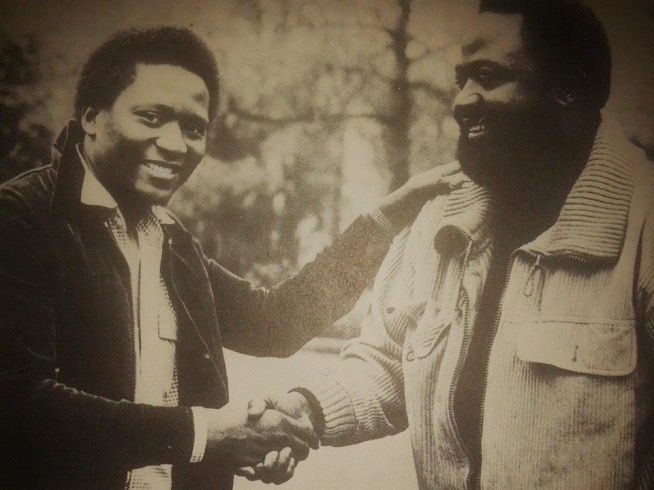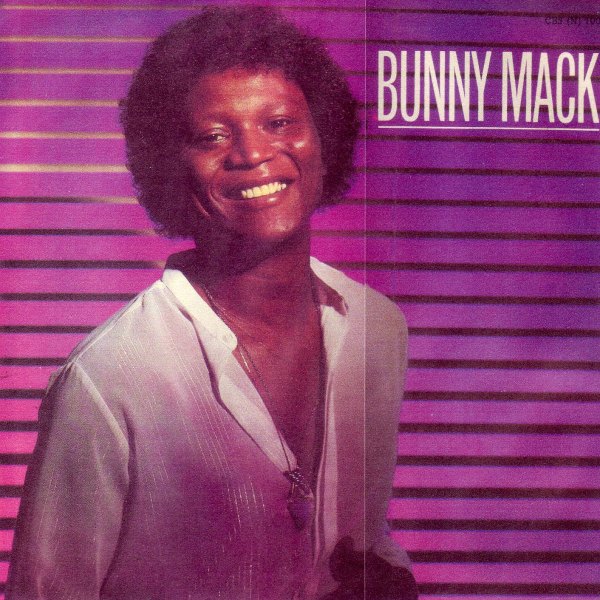Let’s just be honest: “Let Me Love You (My Sweetie)” by Bunny Mack has one of the funkiest bass lines ever laid down on a dance track. Composed by Bunny Mack (producer Akie Deen shares writing credits on the song as well), it was a continuation of a style of music he had developed with Deen, where he fused disco with calypso, African and funk grooves. “Let Me Love You (My Sweetie)” became one of the biggest African releases; it made the British pop charts in early 1980, reaching Number 76, and cracked the top 10 dance chart there, where it stayed for about 4 weeks. With its slamming bass line and infectious chorus, the melodic tune became a dance classic throughout the African diaspora, generating in the process a certain confusion about who sang it and which country it originated from. Play it for virtually anyone from the African diaspora, and the odds are that they have either partied to it, or played it themselves if they are DJs. When an African American friend asked me excitedly a few years back if I had heard “this new African song” as she put it, and sang “Let Me Love You,” I had to patiently inform her it’s old, but it’s a classic, and that’s why it seems new.
It has been a few decades now, but I do remember well when Bunny Mack was interviewed by a radio show host back in either late ’79 or early ’80s Sierra Leone. This was fascinating to me because I had never really considered Sierra Leone music in terms of solo artists. We had a bunch of semi-successful bands with decent hits, like Afro National, Sabanoh 75 and Supercombo, and each had solid musicians that were very talented in their own right. But the last really international solo artist from Sierra Leone I remember hearing about was Geraldo Pino, and he ended up moving permanently to Nigeria (a few of his songs are still mined by funk and soul DJs looking for the latest rare groove sample). What was different for me about Bunny Mack – at least in my young mind – was that he actually fit the mold of an international pop star. Cool stage name – check. Dashing good looks – check. Afro hairstyle – check; virtually all the things that I associated with “stardom” at the time. By the time I heard him talking about his career on the radio he had already made “Discolypso,” released the year before, which was also a hit, and was on his first LP Let Me Love You, released on Rokel Records in the UK. Bunny Mack followed it up with the hugely popular album Supafrico in 1982, released on the WIN label, a subsidiary of Lagos-based Tabansi Records, which included the very funky title track. It seemed like he was the hardest working man in Sierra Leone show biz when he released his third LP in 1983, which yielded “Angel in Disguise” and “I Really Love You,” featuring King Masco.
I first met Bunny Mack in person almost a decade later when he returned to Sierra Leone again, and we worked together briefly at the new radio station. I was already in awe of the man by then, and once when he asked me to clarify something he was in doubt about concerning an up and coming artist, I remember being surprised, wondering what a legend like him would even need to find out from a small fry like me. He was such a classy professional, worked well with everyone, and believed firmly in doing things the correct way. As I left the country and went out to explore the diaspora, I rediscovered the song “Let Me Love You (My Sweetie)” in nightclubs and parties, and realized how much of a classic Bunny Mack had created. Hearing the song again after a very long time is like hearing something like “Billie Jean,” or “When Doves Cry” again after it’s been a while since you heard them. You suddenly remember why the song is so good. You realize how much you have missed it, almost like an old friend you haven’t bonded with in years. What is easy to forget about “Let Me Love You (My Sweetie)” – or just gets lost in the funk – is that it’s kind of a tribute, a glorious ode to women complete with allusions to the spiritual. “My woman lifted me from hell,” in the first verse, and later, with a reference to the creation story: “Then man came down for the world to cheer/ He needed someone by his side/ When woman came she turned the tide.” Allow me to love you, because I think you’re so amazing, he seems to say, as opposed to the usual “let me love you because I’m the man.” Even a love song written with that intent would have been a classic.
Late in 2010 when Sierra Leone was preparing to celebrate 50 years of independence from colonial rule,

I captured this shot of (L-R) Collins Pratt, Bunny Mack and King Masco, repping SL at the 50th Independence Anniversary Concert
Bunny Mack surprised me again, this time by agreeing to an on-camera interview for a documentary film we were working on for the anniversary. I was touched and honored, as he talked with us about his career, his love for his country, and his slated performance at the upcoming anniversary celebrations. He even let us know what he thought about the Nigerian rapper Wale’s song that featured a heavy sample of his classic “Let Me Love You (My Sweetie).” The next year, in the days leading up to the 50th independence anniversary, I watched him in Freetown as he rehearsed with another Sierra Leonean music great Collins Pratt (De Champ), and was reminded why he had been so successful. The professionalism and dedication they displayed during those sessions I was present for was remarkable, but expected.
Afrofusion TV would like to recognize and pay tribute to Mr. Cecil Bunting MacCormack, his body of work, and his contribution to the music industry in Africa. He made his country proud; through his hard work and determination, he was able to do what no other Sierra Leone music artist has yet accomplished. We offer our sincere condolences to his wife Violet, and children Cecilia, Kris and Tracey, and his brother Aki. His son, popular radio deejay Kris MacCormack, released a statement last Saturday, an excerpt of which is below:
“Born Cecil Bunting MacCormack in Freetown, developing musical abilities from the age of six. He then dabbled with singing as a teenage chorister before picking up the guitar as an instrument of choice – way back in the early 60’s. By 1965 he was widely recognised as the lead guitarist with one of the popular dance bands of the day – The Echoes – before defecting to The Soundcasters in the same year. By mid-1966 The Soundcasters were on their way to the UK where they gained a reputation as a live act not just in England but also right across Europe, particularly in Germany.
With The Soundcasters splitting up in 1970 Bunny Mack settled in the UK and married his childhood sweetheart Violet while still pursuing music on a lower scale, amassing a huge catalogue of self-written songs (“Angel In Disguise” and “Anabella” were actually written during this period) and playing in various little-known bands such as Sweet Street and Liberation. His co-vocalist in the latter was one Billy Ocean! Later in the decade he met record producer/promoter extraordinaire – the late Akie Deen, who had already made his mark on Sierra Leonean music thanks to his work with Sabannoh 75, Afro National and Miata Fahnbulleh. Together they established the trademark ‘Bunny Mack’ sound with the release of “Discolypso” and “Funny Lady” in mid-1979. However, it was their next release that really established him as a household name.“
Bunny Mack’s popular songs will stay alive in all our hearts and minds, especially that endearing classic “Let Me Love You (My Sweetie),” which will undoubtedly live forever on dance floors throughout the African Diaspora. Rest in Power, Bunny Mack. Bless…















